senior pet support
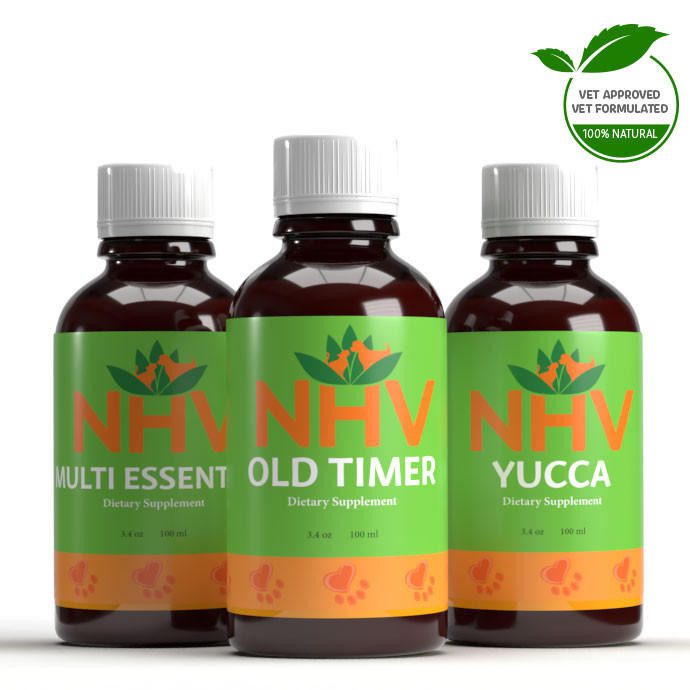
free shipping over $100 (USA & Canada)
1-877-937-4372 the pet expert hotline

Holistic Support for Feline and Canine Cognitive Dysfunction

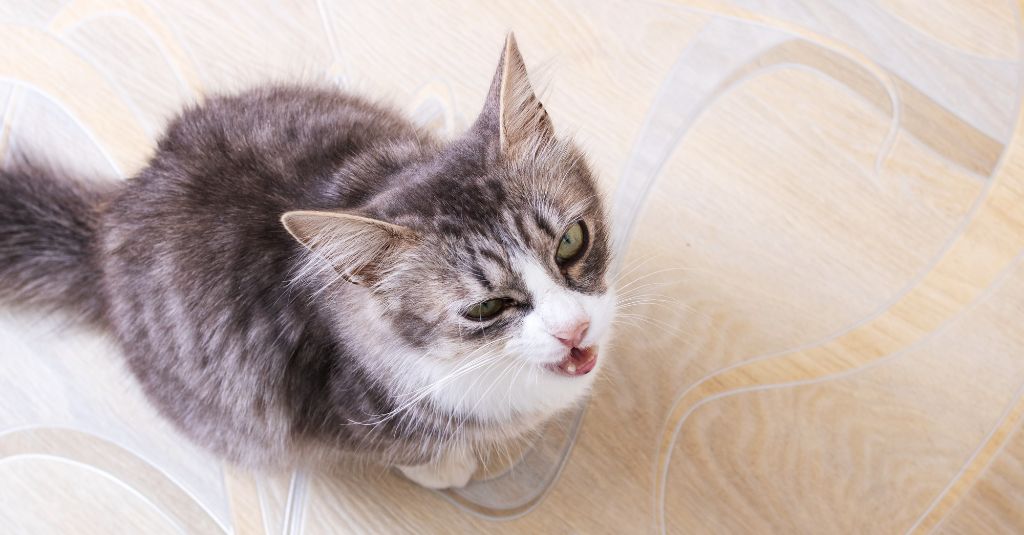
Witnessing a confused cat grapple with behavioral and cognitive changes can be one of the challenges of caring for a senior kitty. You may notice differences in their behavior, physicality, mobility, appearance, and temperament as they approach their golden years. Many of these changes start happening as early as 11 years of age and are entirely normal. Others may be indicative of various health concerns and debilitation of your feline companion’s cognitive abilities. Understanding and addressing these transformations are integral to providing supportive care for your aging cat.
Anticipating and understanding the behavioral changes in aging cats is crucial for providing comprehensive care. Some typical changes you may observe include:
Some of these behavior changes listed above can indicate underlying health concerns, which is why it is vital to keep up with your regular checkups with your local vet. Additionally, some changes might point to cognitive decline or dysfunctions, including:
Mental stimulation, adequate nutrition, and a supportive environment can go a long way in supporting your senior and confused cat.
When evaluating cognitive decline, it’s crucial to rule out other health concerns through regular checkups, including a yearly physical, geriatric blood panel, and urinalysis. These diagnostic measures can provide insight into the internal workings of various bodily systems and ensure their regular functioning. If everything returns to normal, your vet will move on to cognitive analysis and test for declines.
Once you discover that your cherished pet is grappling with cognitive dysfunction, there are various proactive steps that pet parents can take to support them on this new journey. Here are some key strategies:
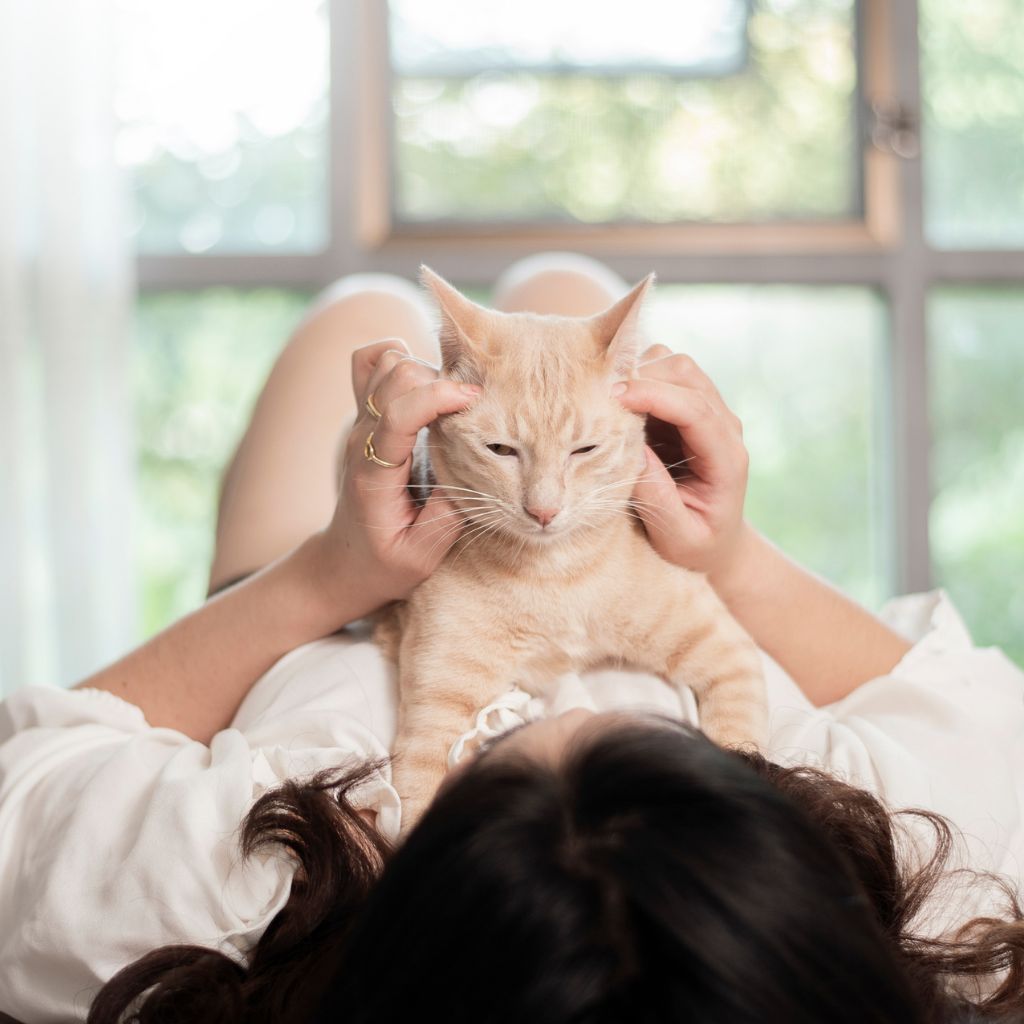
Providing a stable living space is crucial. Keep their environment clean, and organized, and avoid sudden changes to routines or surroundings. This helps minimize confusion and anxiety.
Consistency in daily activities, from waking up and walking to feeding and bathroom breaks, can be immensely beneficial in providing a sense of stability for your pet.
Make sure your pet has easy access to food, water, and their favorite spots around the house. A well-balanced diet, rich in vitamin E, EPA, DHA, and antioxidants, can also contribute to maintaining a healthy nervous system. Adding NHV Multi Essentials and NHV PetOmega 3 to their regimen can also help ensure they receive the vital nutrients necessary for their optimal health.
Recognize the potential for increased accidents and be a supportive, safe space for your pet. Providing extra patience, attention, and love is crucial during this time. NHV Matricalm can also help! This natural herbal product was designed to help reduce excitability in your pet, reduce aggressive behavior, and provide anxiety and stress relief for your cat.
Engage your pet in mental stimulation activities to keep their mind active and enhance cognitive function. Puzzle toys, interactive games, and training exercises are excellent tools for this purpose.
Incorporate routine physical exercise suitable for your pet’s capabilities. Additionally, ensure proper socialization, which contributes to overall brain health.
Proactive care emerges as a valuable tool, whether applied before or after a diagnosis. By investing time and effort into mental stimulation activities and maintaining a consistent and supportive environment, you can enhance the well-being and cognitive function of your beloved pet during this challenging phase of their life.
Adequate nutrition is also essential for senior pets, especially ensuring they receive a balanced diet supporting brain health. Additionally, addressing mental well-being and stress management is crucial, as these factors can be interconnected with early cognitive decline and various other health issues. These are some natural supplements that can help with nutritional, brain, and stress support:
NHV Natures Immuno, our mushroom blend, is rich in antioxidants, is a beneficial support for memory loss, has been used to treat various degenerative brain diseases, and can aid in healthy cell growth.
NHV Old Timer offers restorative action with its rich source of antioxidants, supports healthy muscles and endurance, and can aid in preventing chronic injury.
NHV Yucca is highly nutritious and can help support many body processes, including nerve function. Its excellent anti-inflammatory properties can alleviate inflammation in the brain and nervous system.
In conclusion, the journey of caring for a confused cat entering its golden years, particularly one grappling with cognitive changes, requires a holistic and proactive approach. We are here to help you stay attuned to your senior kittie’s needs and address them with compassion and informed choices. Feel free to message us by clicking the link below!
senior pet support

Holistic Dog and Cat Daily Supplements
bundle and save with pet expert kits
3 month supply for a small to medium size
As our furbabies age, the daily routines of our senior pets may need to adjust to give them a little extra support. NHV’s Rejuvenation Kit for Senior Pet Care is a comprehensive supplement bundle that helps relieve discomfort from stiff joints and support overall vitality as well as slow down or prevent chronic illness so your pet can age gracefully.

As our furbabies age, the daily routines of our senior pets may need to adjust to give them a little extra support. NHV’s Rejuvenation Kit for Senior Pet Care is a comprehensive supplement bundle that helps relieve discomfort from stiff joints and support overall vitality as well as slow down or prevent chronic illness so your pet can age gracefully.
Holistic Support for Aging Pets - Senior Pet Products
Whether you raised your furkiddo from a young pup or they have come into your life with a frosted face, watching them age is tough. As pet parents, we need to cherish every moment we have with them, and remember to have lots of patience and lend support when they need it. This supplement bundle is formulated to provide support for aging senior pets, so they can remain full of pep for as long as possible! NHV Rejuvenation Kit for Senior Pets contains Old Timer, Multi Essentials, and Yucca to naturally relieve stiff joints, help fill nutritional voids, and promote healthy metabolism and energy levels.
How NHV Supplements Restore Health and Support Vitality
Just like humans, as our furry companions reach their golden years, they may have a few more bumps, bruises and aches than they used to. That's totally normal! We all need different levels of support at different stages in life. Ingredients like Alfalfa, Asian Ginseng, Astragalus, and Ginger in Old Timer are very gentle aids that help relieve inflammation and joint discomfort, gently detoxify and help improve energy levels. Multi Essentials contains a proprietary blend of herbs with a broad range of vitamins and mineral properties to improve metabolism and nutrient absorption. It also helps stimulate healthy immune function and promote overall vitality. Yucca has excellent anti-inflammatory properties beneficial for relieving muscle and joint discomfort and restoring appetite.
Common Issues in Senior Pets:
OLD TIMER
MULTI ESSENTIALS
YUCCA
Additional support for senior pet care
For pet parents with a purebred pet, get to know your little one’s unique history and personality with our dog and cat breed pages.
Natural Support for a Long Life
Apart from adding supplements to their daily care plan, learn how your furkiddo can live their best life with an NHV personalized diet that takes into consideration their age, breed and medical history with our in-house veterinarian, Dr. Amanda, who brings years of experience and care to her dietary consultations.
Made with the finest, organically grown, or ethically harvested herbs. Made specifically for pets, vet-formulated and vet approved.
Old Timer
Multi Essentials
Yucca
Select your pet's weight to determine the correct dose.
To be taken twice daily. Determine your pet’s weight and then use the easy chart below to determine the correct dose. This is the minimum dosage.
Pet's Weight Dosage
0 - 15 lb = 0.5 ml
16 - 30 lb = 1.0 ml
31 - 45 lb = 1.5 ml
46 - 60 lb = 2.0 ml
61 - 75 lb = 2.5 ml
Over 75 lb = 3.0 ml
How to Administer
Shake well before use. The easiest method is to use the dropper provided and place the drops into your pet’s food or favorite treat. You can also use the dropper and squirt directly into the pet’s mouth. Some pets can be finicky, if this occurs consider hiding the drops in foods most pet’s love such as fish, chicken or yogurt or a favorite treat. If your pet only eats dry food then soak a few kibbles at feeding time.
For Best Results
Herbal dietary supplements are beneficial to the health and well-being of your pet and are safe for long-term use. Every pet responds to natural herbal supplements differently, therefore it is important to be consistent and administer the product daily. Supplements generally take two to four weeks to take effect, however this will vary from one animal to the next.
Product Storage
All NHV Natural Pet Products are pure herbal extracts and contain no artificial additives, preservatives or coloring. Shelf life after opening is 6 months and must be refrigerated after opening.
Cautions and Contraindications
Do not use in pregnant or nursing animals.
All information provided by NHV Natural Pet Products is for educational purposes only.
Holistic Support for Aging Pets - Senior Pet Products
Whether you raised your furkiddo from a young pup or they have come into your life with a frosted face, watching them age is tough. As pet parents, we need to cherish every moment we have with them, and remember to have lots of patience and lend support when they need it. This supplement bundle is formulated to provide support for aging senior pets, so they can remain full of pep for as long as possible! NHV Rejuvenation Kit for Senior Pets contains Old Timer, Multi Essentials, and Yucca to naturally relieve stiff joints, help fill nutritional voids, and promote healthy metabolism and energy levels.
How NHV Supplements Restore Health and Support Vitality
Just like humans, as our furry companions reach their golden years, they may have a few more bumps, bruises and aches than they used to. That's totally normal! We all need different levels of support at different stages in life. Ingredients like Alfalfa, Asian Ginseng, Astragalus, and Ginger in Old Timer are very gentle aids that help relieve inflammation and joint discomfort, gently detoxify and help improve energy levels. Multi Essentials contains a proprietary blend of herbs with a broad range of vitamins and mineral properties to improve metabolism and nutrient absorption. It also helps stimulate healthy immune function and promote overall vitality. Yucca has excellent anti-inflammatory properties beneficial for relieving muscle and joint discomfort and restoring appetite.
Common Issues in Senior Pets:
OLD TIMER
MULTI ESSENTIALS
YUCCA
Additional support for senior pet care
For pet parents with a purebred pet, get to know your little one’s unique history and personality with our dog and cat breed pages.
Natural Support for a Long Life
Apart from adding supplements to their daily care plan, learn how your furkiddo can live their best life with an NHV personalized diet that takes into consideration their age, breed and medical history with our in-house veterinarian, Dr. Amanda, who brings years of experience and care to her dietary consultations.
Made with the finest, organically grown, or ethically harvested herbs. Made specifically for pets, vet-formulated and vet approved.
Old Timer
Multi Essentials
Yucca
Select your pet's weight to determine the correct dose.
To be taken twice daily. Determine your pet’s weight and then use the easy chart below to determine the correct dose. This is the minimum dosage.
Pet's Weight Dosage
0 - 15 lb = 0.5 ml
16 - 30 lb = 1.0 ml
31 - 45 lb = 1.5 ml
46 - 60 lb = 2.0 ml
61 - 75 lb = 2.5 ml
Over 75 lb = 3.0 ml
How to Administer
Shake well before use. The easiest method is to use the dropper provided and place the drops into your pet’s food or favorite treat. You can also use the dropper and squirt directly into the pet’s mouth. Some pets can be finicky, if this occurs consider hiding the drops in foods most pet’s love such as fish, chicken or yogurt or a favorite treat. If your pet only eats dry food then soak a few kibbles at feeding time.
For Best Results
Herbal dietary supplements are beneficial to the health and well-being of your pet and are safe for long-term use. Every pet responds to natural herbal supplements differently, therefore it is important to be consistent and administer the product daily. Supplements generally take two to four weeks to take effect, however this will vary from one animal to the next.
Product Storage
All NHV Natural Pet Products are pure herbal extracts and contain no artificial additives, preservatives or coloring. Shelf life after opening is 6 months and must be refrigerated after opening.
Cautions and Contraindications
Do not use in pregnant or nursing animals.
All information provided by NHV Natural Pet Products is for educational purposes only.
joint support
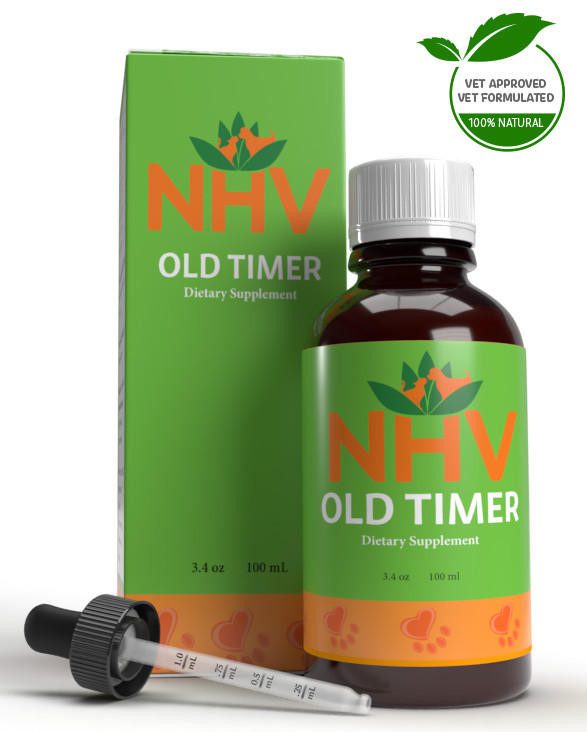
For Arthritis, Muscle and Joint Discomfort Relief in Cats.
buy 2 and save $3
3 month supply for a small to medium size pet
Old Timer is a natural supplement that supports cat joint movement, relieves discomfort, and reduces inflammation.

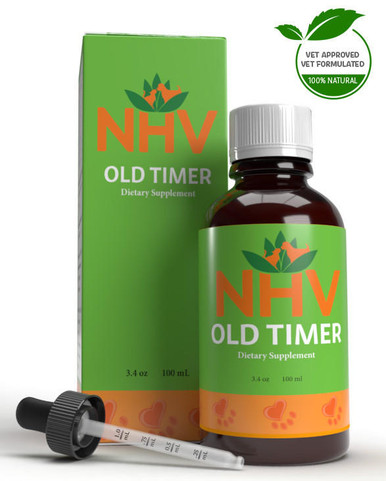
Old Timer is a natural supplement that supports cat joint movement, relieves discomfort, and reduces inflammation.

Provide cat joint support and ease the discomfort arthritis can cause with Old Timer, an herbal tonic that helps in the management of arthritis and its symptoms. Arthritis is a degenerative disease that tends to affect the elbow joints in cats (though any joint can be affected). It’s a debilitating condition that can lead to hip dysplasia and impaired mobility.
Arthritis gradually becomes worse over time and can become debilitating to your cat. To help with this condition, keep your cat away from cold or damp areas and provide opportunities to stimulate them with exercise.
Also, talk to your vet about means of joint discomfort relief for your cat. Adding holistic supplements, such as those by NHV to your vet’s conventional treatment plan, along with other holistic therapies like hydrotherapy and acupuncture is an effective way to provide excellent cat joint support.
Getting or keeping your frosted face kitty or doggo at a healthy weight can help decrease the pressure on the bones and joints.
Vet-formulated, holistic supplements by NHV are safe to use long-term. They’re ethically-sourced with Non-GMO ingredients. If you have questions, ask our pet experts at NHV. We’re here to help alleviate your pet’s discomfort naturally.
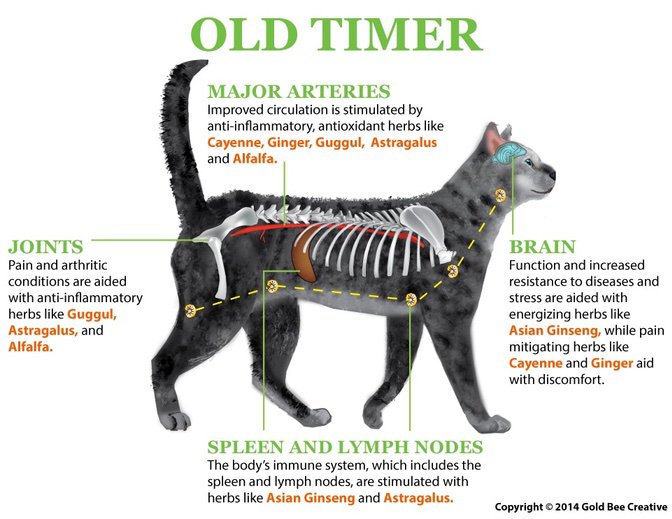
Guggul – Eases uncomfortable arthritis symptoms.
Asian Ginseng – Contains natural immune-supporting properties.
Ginger – An antioxidant and anti-inflammatory.
Astragalus – Helps support the immune system by enhancing phagocytic activity and increasing interferon production.
Alfalfa – A plant containing vitamins, amino acids, minerals, and high protein levels.
Cayenne – A tonic with anti-inflammatory properties.
Select your pet's weight to determine the correct dose.
To be taken twice daily. Determine your pet’s weight and then use the easy chart below to determine the correct dose. This is the minimum dosage.
Pet's Weight Dosage
0 - 15 lb = 0.5 ml
16 - 30 lb = 1.0 ml
31 - 45 lb = 1.5 ml
46 - 60 lb = 2.0 ml
61 - 75 lb = 2.5 ml
Over 75 lb = 3.0 ml
How to Administer
Shake well before use. The easiest method is to use the dropper provide and places the drops into your pet’s food or favorite treat. You can also use the dropper and squirt directly into the pet’s mouth.
Some pets can be finicky, if this occurs consider hiding the drops in foods most pet’s love such as fish, chicken or yogurt or a favorite treat. If your pet only eats dry food then soak a few kibbles at feeding time.
For Best Results
Herbal dietary supplements are beneficial to the health and wellbeing of your pet and are safe for long-term use. Every pet responds to natural herbal supplements differently, therefore it is important to be consistent and administer the product daily. Supplements generally take two to four weeks to take effect, however this will vary from one animal to the next.
Product Storage
All NHV Natural Pet Products are pure herbal extracts and contain no artificial additives, preservatives or coloring. Shelf life after opening is 6 months and must be refrigerated after opening.
Cautions and Contraindications
Do not use Old Timer in pregnant or nursing animals. Should be used in moderation in cases of sensitive digestive tract. Speak to your vet before using our products. A second visit is recommended if your pet’s condition does not improve, or deteriorates after continued use of the supplements.
All information provided by NHV Natural Pet Products is for educational purposes only.
Provide cat joint support and ease the discomfort arthritis can cause with Old Timer, an herbal tonic that helps in the management of arthritis and its symptoms. Arthritis is a degenerative disease that tends to affect the elbow joints in cats (though any joint can be affected). It’s a debilitating condition that can lead to hip dysplasia and impaired mobility.
Arthritis gradually becomes worse over time and can become debilitating to your cat. To help with this condition, keep your cat away from cold or damp areas and provide opportunities to stimulate them with exercise.
Also, talk to your vet about means of joint discomfort relief for your cat. Adding holistic supplements, such as those by NHV to your vet’s conventional treatment plan, along with other holistic therapies like hydrotherapy and acupuncture is an effective way to provide excellent cat joint support.
Getting or keeping your frosted face kitty or doggo at a healthy weight can help decrease the pressure on the bones and joints.
Vet-formulated, holistic supplements by NHV are safe to use long-term. They’re ethically-sourced with Non-GMO ingredients. If you have questions, ask our pet experts at NHV. We’re here to help alleviate your pet’s discomfort naturally.

Guggul – Eases uncomfortable arthritis symptoms.
Asian Ginseng – Contains natural immune-supporting properties.
Ginger – An antioxidant and anti-inflammatory.
Astragalus – Helps support the immune system by enhancing phagocytic activity and increasing interferon production.
Alfalfa – A plant containing vitamins, amino acids, minerals, and high protein levels.
Cayenne – A tonic with anti-inflammatory properties.
Select your pet's weight to determine the correct dose.
To be taken twice daily. Determine your pet’s weight and then use the easy chart below to determine the correct dose. This is the minimum dosage.
Pet's Weight Dosage
0 - 15 lb = 0.5 ml
16 - 30 lb = 1.0 ml
31 - 45 lb = 1.5 ml
46 - 60 lb = 2.0 ml
61 - 75 lb = 2.5 ml
Over 75 lb = 3.0 ml
How to Administer
Shake well before use. The easiest method is to use the dropper provide and places the drops into your pet’s food or favorite treat. You can also use the dropper and squirt directly into the pet’s mouth.
Some pets can be finicky, if this occurs consider hiding the drops in foods most pet’s love such as fish, chicken or yogurt or a favorite treat. If your pet only eats dry food then soak a few kibbles at feeding time.
For Best Results
Herbal dietary supplements are beneficial to the health and wellbeing of your pet and are safe for long-term use. Every pet responds to natural herbal supplements differently, therefore it is important to be consistent and administer the product daily. Supplements generally take two to four weeks to take effect, however this will vary from one animal to the next.
Product Storage
All NHV Natural Pet Products are pure herbal extracts and contain no artificial additives, preservatives or coloring. Shelf life after opening is 6 months and must be refrigerated after opening.
Cautions and Contraindications
Do not use Old Timer in pregnant or nursing animals. Should be used in moderation in cases of sensitive digestive tract. Speak to your vet before using our products. A second visit is recommended if your pet’s condition does not improve, or deteriorates after continued use of the supplements.
All information provided by NHV Natural Pet Products is for educational purposes only.
senior support
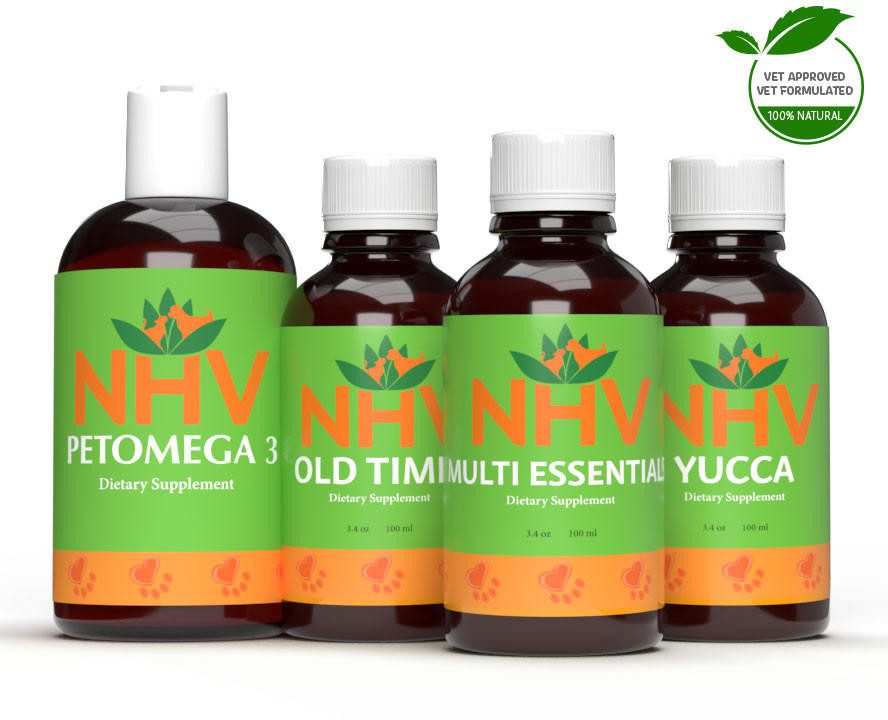
PetOmega 3, Multi Essentials, Yucca & Old Timer
bundle and save with pet expert kits
3 month supply for a small to medium size
Just like humans, as our furry friends reach their golden years, they may need a little extra support to age gracefully. NHV’s Vitality Kit for Senior Pets is a comprehensive bundle that supports overall joint, skin, and coat health as well as helps slow down or prevent chronic illness.


Just like humans, as our furry friends reach their golden years, they may need a little extra support to age gracefully. NHV’s Vitality Kit for Senior Pets is a comprehensive bundle that supports overall joint, skin, and coat health as well as helps slow down or prevent chronic illness.

Regardless of what age your furry friend is when you take them home, it is always tough to see them get older or fall ill. As pet parents, we need to enjoy every moment together, have lots of patience, and lend a hand when they need it. NHV Vitality Kit for Senior Pets contains Petomega3, Old Timer, Multi Essentials, and Yucca to encourage healthy skin and coat, help relieve stiff joints, help fill nutritional voids, and promote overall vitality so your pets may keep their pep for years to come.
For pet parents with purebred furbabies, check out our dog breed and cat breed pages to become better acquainted with your pet’s unique history and personality.
Just like humans, our aging furry friends may have a few more bumps, bruises, and scrapes as the years go by. That's totally normal! We all require varying levels of support at different points in our lives.
Additional Info:
Common Issues in Senior Pets:
It’s great to know that there are ways to support your furkiddo’s health naturally! Apart from adding supplements to their daily care plan, if you’re wondering about senior dog food or senior cat food options, a personalized diet for your pet, created by Dr. Amanda, is a great way to support your furry friend’s aging body and unique health needs.
Made with the finest, organically grown, or ethically harvested herbs. Made specifically for pets, vet-formulated, and vet approved.
Petomega 3
Old Timer
Multi Essentials
Yucca
Select your pet's weight to determine the correct dose.
MULTI ESSENTIALS, YUCCA, OLD TIMER
To be taken twice daily. Determine your pet’s weight and then use the easy chart below to determine the correct dose. This is the minimum dosage.
Pet's Weight Dosage
0 - 15 lb = 0.5 ml
16 - 30 lb = 1.0 ml
31 - 45 lb = 1.5 ml
46 - 60 lb = 2.0 ml
61 - 75 lb = 2.5 ml
Over 75 lb = 3.0 ml
How to Administer
Shake well before use. The easiest method is to use the dropper provided and place the drops into your pet’s food or favorite treat. You can also use the dropper and squirt directly into the pet’s mouth. Some pets can be finicky, if this occurs consider hiding the drops in foods most pet’s love such as fish, chicken or yogurt or a favorite treat. If your pet only eats dry food then soak a few kibbles at feeding time.
PETOMEGA 3
Suggested Dosage: To be taken once per day. Add to food based on weight chart.
Therapeutic Dosage: Double the quantity for maximum period of 4 weeks or follow veterinarian advise.
0-15 lb = ¼ tsp
15-30 lb = ½ tsp
30-60 lb = 1 tsp
60-90 lb = 1 ½ tsp
For Best Results
Herbal dietary supplements are beneficial to the health and well-being of your pet and are safe for long-term use. Every pet responds to natural herbal supplements differently, therefore it is important to be consistent and administer the product daily. Supplements generally take two to four weeks to take effect, however this will vary from one animal to the next.
Product Storage
All NHV Natural Pet Products are pure herbal extracts and contain no artificial additives, preservatives or coloring. Shelf life after opening is 6 months and must be refrigerated after opening.
Cautions and Contraindications
Do not use in pregnant or nursing animals.
All information provided by NHV Natural Pet Products is for educational purposes only.
Regardless of what age your furry friend is when you take them home, it is always tough to see them get older or fall ill. As pet parents, we need to enjoy every moment together, have lots of patience, and lend a hand when they need it. NHV Vitality Kit for Senior Pets contains Petomega3, Old Timer, Multi Essentials, and Yucca to encourage healthy skin and coat, help relieve stiff joints, help fill nutritional voids, and promote overall vitality so your pets may keep their pep for years to come.
For pet parents with purebred furbabies, check out our dog breed and cat breed pages to become better acquainted with your pet’s unique history and personality.
Just like humans, our aging furry friends may have a few more bumps, bruises, and scrapes as the years go by. That's totally normal! We all require varying levels of support at different points in our lives.
Additional Info:
Common Issues in Senior Pets:
It’s great to know that there are ways to support your furkiddo’s health naturally! Apart from adding supplements to their daily care plan, if you’re wondering about senior dog food or senior cat food options, a personalized diet for your pet, created by Dr. Amanda, is a great way to support your furry friend’s aging body and unique health needs.
Made with the finest, organically grown, or ethically harvested herbs. Made specifically for pets, vet-formulated, and vet approved.
Petomega 3
Old Timer
Multi Essentials
Yucca
Select your pet's weight to determine the correct dose.
MULTI ESSENTIALS, YUCCA, OLD TIMER
To be taken twice daily. Determine your pet’s weight and then use the easy chart below to determine the correct dose. This is the minimum dosage.
Pet's Weight Dosage
0 - 15 lb = 0.5 ml
16 - 30 lb = 1.0 ml
31 - 45 lb = 1.5 ml
46 - 60 lb = 2.0 ml
61 - 75 lb = 2.5 ml
Over 75 lb = 3.0 ml
How to Administer
Shake well before use. The easiest method is to use the dropper provided and place the drops into your pet’s food or favorite treat. You can also use the dropper and squirt directly into the pet’s mouth. Some pets can be finicky, if this occurs consider hiding the drops in foods most pet’s love such as fish, chicken or yogurt or a favorite treat. If your pet only eats dry food then soak a few kibbles at feeding time.
PETOMEGA 3
Suggested Dosage: To be taken once per day. Add to food based on weight chart.
Therapeutic Dosage: Double the quantity for maximum period of 4 weeks or follow veterinarian advise.
0-15 lb = ¼ tsp
15-30 lb = ½ tsp
30-60 lb = 1 tsp
60-90 lb = 1 ½ tsp
For Best Results
Herbal dietary supplements are beneficial to the health and well-being of your pet and are safe for long-term use. Every pet responds to natural herbal supplements differently, therefore it is important to be consistent and administer the product daily. Supplements generally take two to four weeks to take effect, however this will vary from one animal to the next.
Product Storage
All NHV Natural Pet Products are pure herbal extracts and contain no artificial additives, preservatives or coloring. Shelf life after opening is 6 months and must be refrigerated after opening.
Cautions and Contraindications
Do not use in pregnant or nursing animals.
All information provided by NHV Natural Pet Products is for educational purposes only.
Published: December 18, 2023